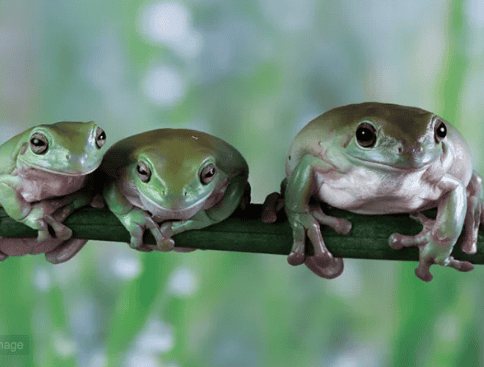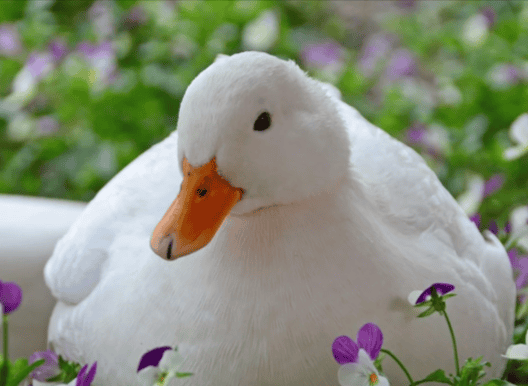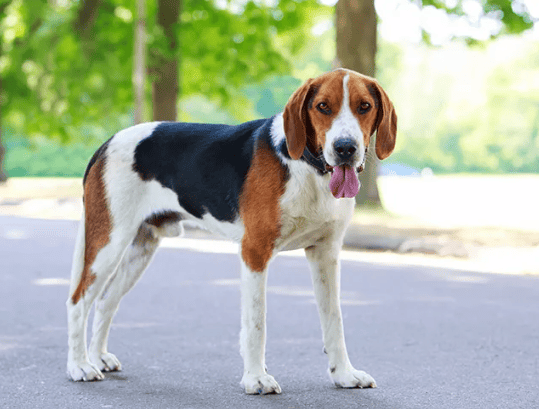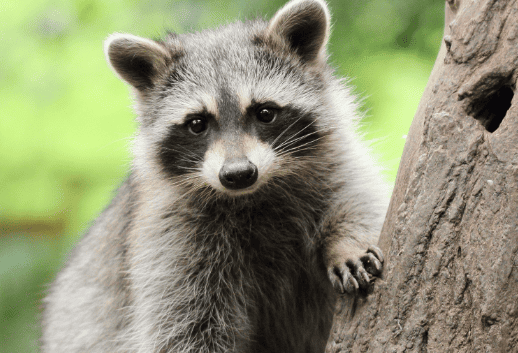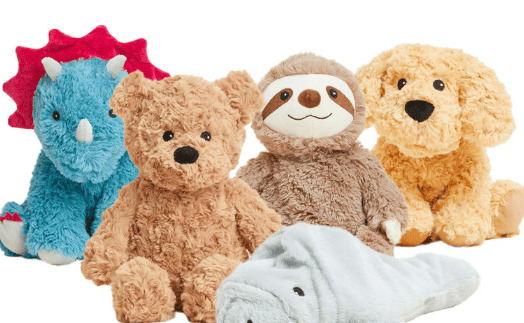Types of Pet Birds
Birds are an incredibly rewarding pet to take care of, and while they require a lot of love, care, and work, they will brighten up their home with their bright eyes, shiny feathers, and social personalities. These birds are the best options to join your home no matter what the layout.
1. Amazon Parrot
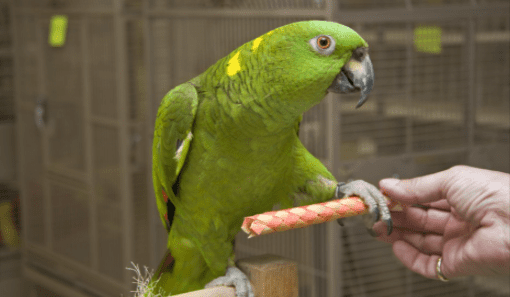
Amazon parrots are among the most common and most popular types of pet bird. These birds are native to Mexico and South America and are known for their playful and outgoing personalities. They can and will keep your home lively and entertaining.
Due to their playful nature, Amazon parrots will need a large cage with plenty of toys and activities. They also tend to be a bit more aggressive in their play-style, especially males, but they love to talk and sing, and can learn to imitate many words and sounds. These creatures also love to eat, and are prone to obesity.
Although a fat bird may look funny, you don’t want to sacrifice your pet’s health. Make sure to encourage and train your parrot so it is important to make sure they are being bathed often and are encouraged to play and exercise.
2. Finch
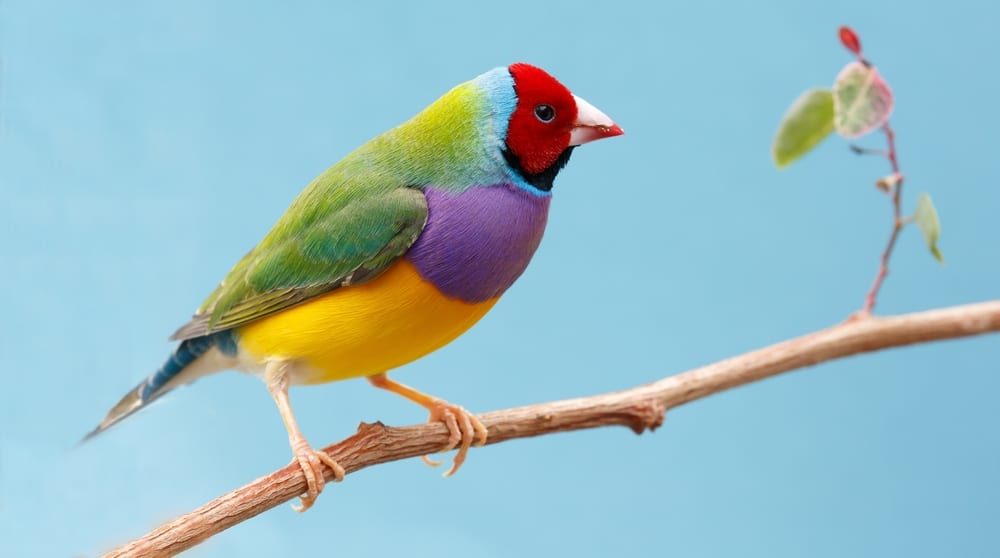
If the Amazon Parrot sounds a bit too high maintenance or involved, then the Finch is the perfect pet bird for you. Known for their hands-off nature, Finches love to have a large enclosure to spread their wings and perform aerial acrobatics.
They also love living with other Finches, and are considerably quieter than parrots. Where parrots can emit loud shrieks and screeches when they need attention, Finches are simply incapable of making those sounds, instead preferring to be among their own kind and take a very hands-off approach to their human friends.
3. Dove
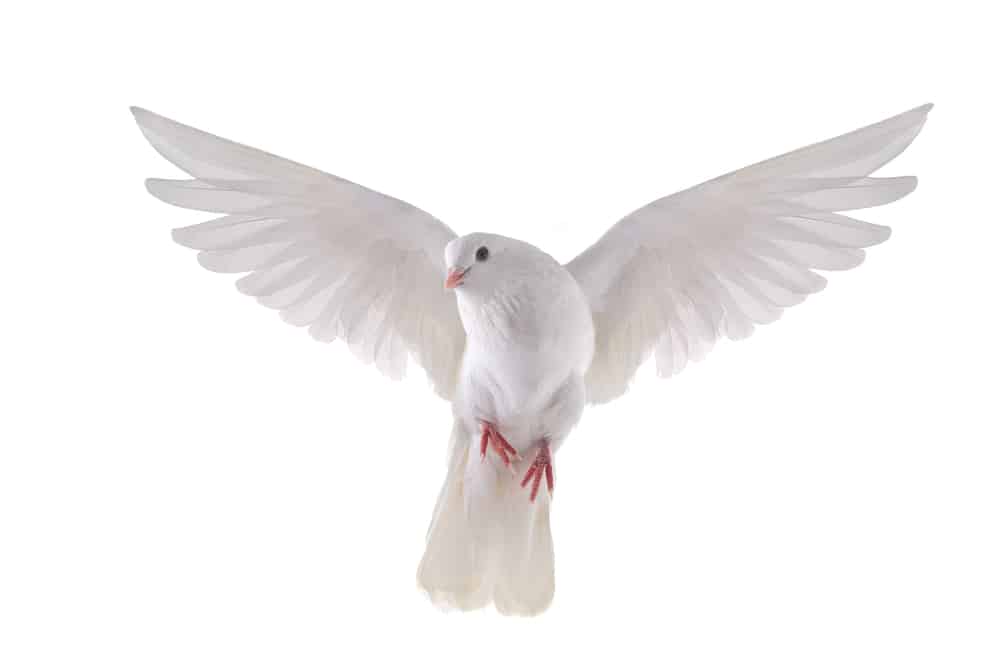
Doves are among the best birds for a pet owner who wants a pet bird without any of the hassle of a parrot. Doves are very low-maintenance pets, and won’t require much in the way of one-on-one social interaction, nor will they make much noise, making them ideal pet birds for people in tighter confines or with close neighbors. Many Dove owners claim their cooing sound is pleasant on the ears.
Owners won’t have to be concerned with a Dove biting like an Amazon Parrot, and they won’t need the massive climbable enclosure either, as Doves fly side-to-side rather than scale the cage.
4. Love Birds
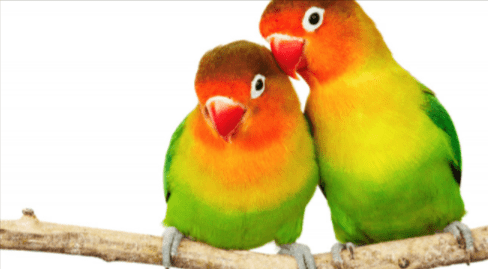
Love Birds are another type of parrot, and so their care will be similar to that of the Amazon parrot. Love Birds are named for their strong pair bonds, tending to enjoy living with one other bird in the largest enclosure available for your home. You have to have two of them!
These birds will need lots of exercise, however due to their pairing they will not require the one-on-one social interaction of Amazon parrots, nor are they prone to the same obesity. Love Birds are curious and playful, much like the Amazon parrot, without the same high-maintenance care requirements.
These birds are also very happy most of the time if they are with their bonded pair. Their gentle coos are very calming.
Now, more specifically we need to figure out how to give your bird the best life possible – so here’s how to take care of the finer things for your pet bird.
5. Parakeet
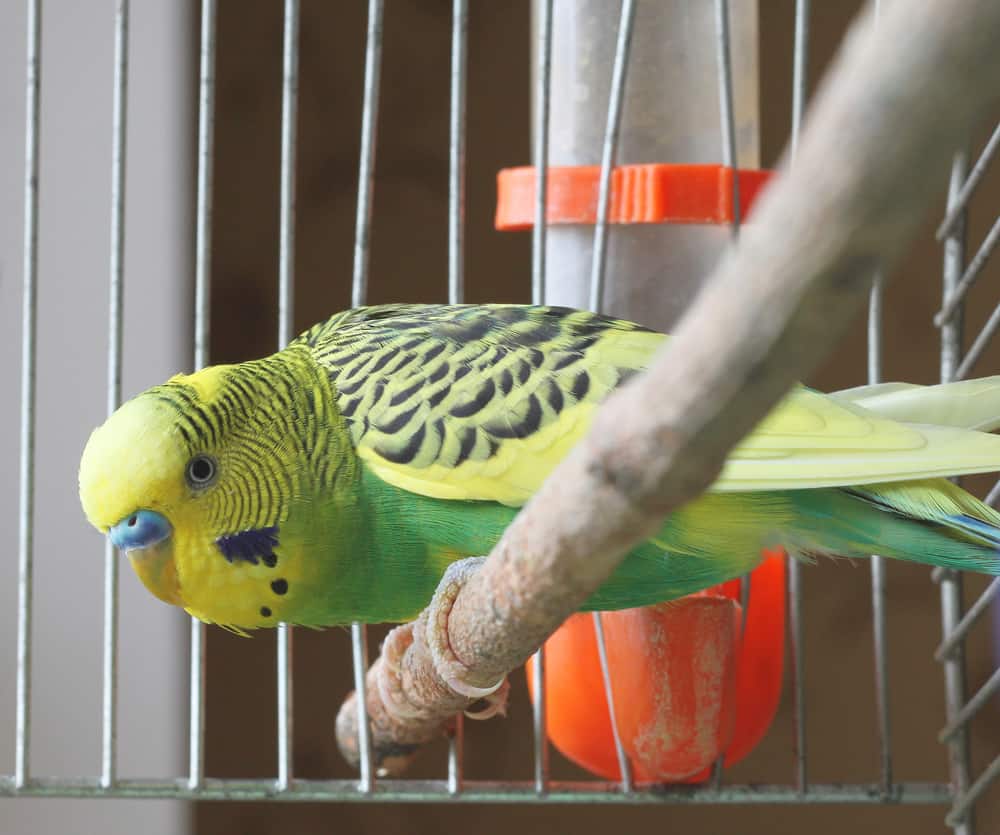
Parakeets, lovably known as budgies, are small to medium-sized green parrots originating from Africa and South Asia. Their chatty disposition and cheerful nature make them a popular choice for first-time bird keepers. They’ll even pick up some human phrases and can be taught if trained properly. Social in nature, parakeets do well in pairs and are happier when shown plenty of affection.
Parakeets do need plenty of space even with their friends around. Spacious cages that have more than 52 inches of height will be enough room. Their upkeep also requires special attention to their beaks. Parakeets beaks can grow up to 3 inches long each year! So a few essentials like wood and cuttlebones will make your parakeet’s maintenance much easier. A great choice for those who enjoy having a talkative neighbor, a parakeet’s upbeat spirits and songs are a pleasure to have.
6. Cockatiel
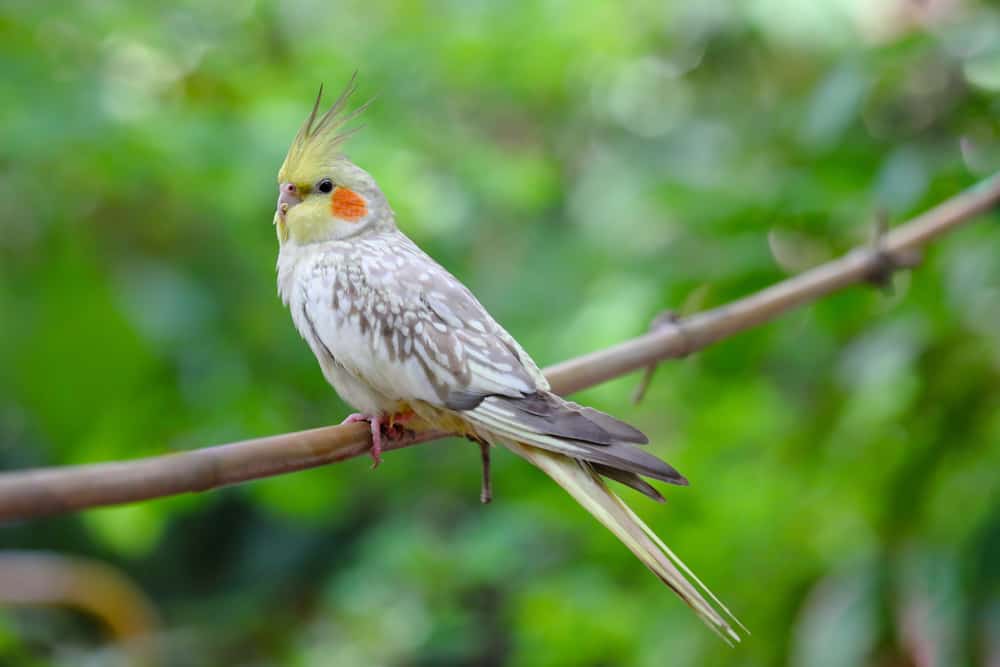
Cockatiels are an American favorite with their beautiful crest feathers attracting everyone to them. Like the parakeets, cockatiels love socializing and snuggling their owners. Their whistles are more prolific than their ability to talk. As ground foragers, they’re happy to walk among your floor and be outside of their cage. The males especially love to look at themselves in the mirror!
You can ensure your cockatiel’s happiness by keeping a large cage with plenty of treats and newspaper on the floor. Cockatiels also tend to be light sleepers, staying alert for potential predators. Ensuring their cage has multiple perches will make it easier for a startled bird to find their resting nest at night. Cockatiels also enjoy new environments so replacing or rearranging items will keep them stimulated. Providing a cockatiel with a safe and exciting environment will create a loyal bond between you and your new friend.
7. Conure
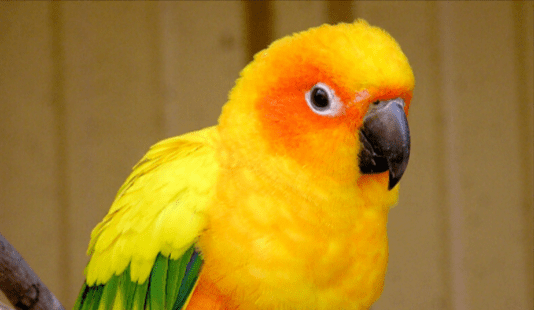
Conures come in a variety of sizes, personalities, and colors. These inquisitive creatures are known to be active birds throughout the day. Conures have a unique voice that screech proudly and loudly! This definitely makes them the center of attention. Though they need to be handled carefully, conures love to be wherever the party is!
This also may be why conures need plenty of space both inside and outside of their cage. Conures are known to pluck off their feathers if they lack proper stimulation. This can lead to screeching behavior which can startle first-time owners. To keep your conure happy, offer an enriched environment that focuses on play and exercise. Depending on the conure, you will find each one has its own unique personality and needs.
8. Canary
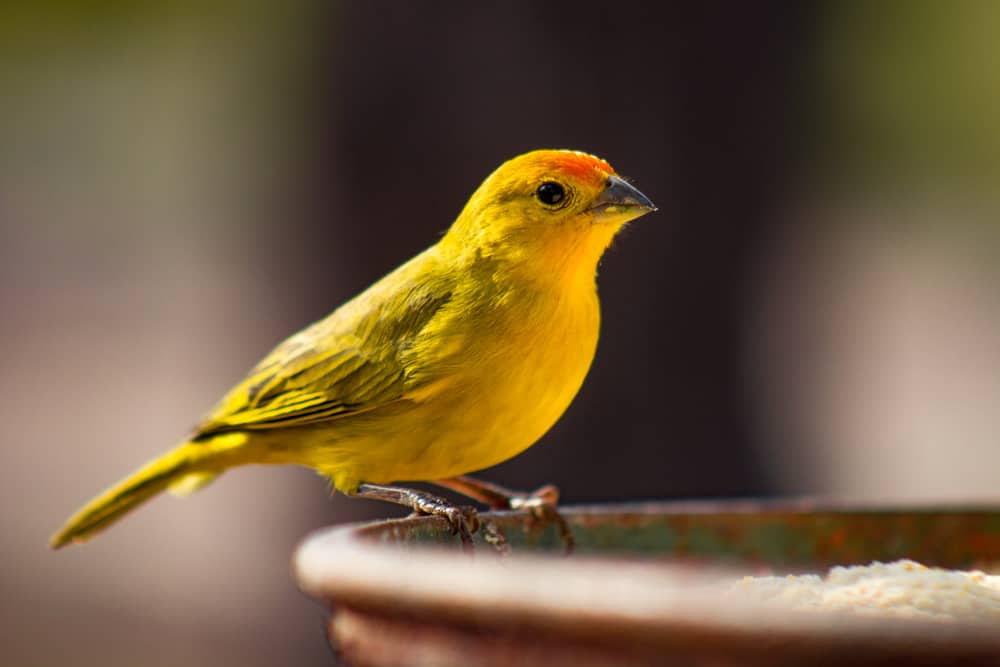
The canaries are a more mild-mannered bird that requires very little to keep them satisfied. Male canaries are known for their singing while females are known to chirp. They have been bred to come in a variety of colors but are known for their bright yellow feathers. Though they are calm-natured, canaries are not as social as their counterparts.
Canaries are best suited for large spaces as they’re known to be territorial. Keeping canaries also requires cages that allow them to fly since they lack features that help them climb around. Their singing is something to be admired and mixed with their peaceful manners, you won’t regret buying one as your first winged friend.
How to Care For Your Pet Bird
Your pet bird’s diet will depend on its breed, but most birds stick to small berries or grains. However, birds are incapable of picking their own diet out of mixed seeds, grains, and berries, so it’s important to be vigilant and research (or ask helpers at your local pet store) exactly what your bird will need to live a healthy and happy life.
You can also consult a veterinarian for their expert opinion. Most of the time if you walk into a pet doctor’s office they can give you some free advice on what type of bird to select based on your unique situation and lifestyle.
How Much Do Pets Birds Cost
This depends on the type of bird you choose too, but it won’t break the bank like a dog or cat might. You can expect to pay between $100 and $200 for the bird itself, and up to $300 in the first year for unforeseen and veterinary expenses. Over the total 10-15 year lifespan of a bird, it will likely cost a few thousand dollars.
If you want to spoil your pet, however; your cost is a choose-your-own-adventure book waiting to be read! Who doesn’t love a happy pet. They make every day better.
How Long Do Pet Birds Live?
Birds are known to live a long time if properly cared for. Some, like the cockatiel, last between 10 to 14 years. Others like the cockatoo last between 40 to 60 years! When properly cared for, the following birds can live up to:
- Parakeets: 10 – 15 years old
- Cockatiels: 10 – 14 years old
- Conures: Up to 20 years old
- Canaries: 10 – 15 years old
Their lengthy life span may be due to their healthy diets that consist of grains, nuts, fruits, and veggies. Diet alone won’t equal a happy pet though. Each bird thrives in unique environments and requires its type of attention. Ensuring exercise and clean supplies, like watering baths, contributes to your bird’s overall happiness. By learning which type fits your lifestyle will increase their quality of life and yours!
We hope you’re ready to have a pet that will love and care for you as much as you care for it.


